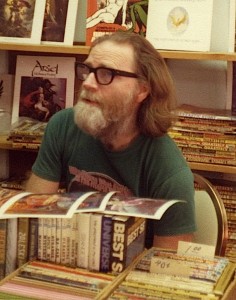
- Rusty Hevelin at a Boskone in the 1970s. Photo by Andrew Porter.
James “Rusty” Hevelin, a winner of First Fandom’s Sam Moskowitz Archive Award (2003) and a past Worldcon Guest of Honor, died December 27 at the age of 89. He was hospitalized a few days ago with poor circulation in his legs. When a planned surgical intervention was cancelled because Rusty’s condition worsened to the point where his surgeon and doctors concluded that he’d be unlikely to survive the surgery, he spent his last days in hospice care.
As a teenager living in Riverside, California, Rusty somehow discovered the Los Angeles Science Fantasy Society. He attended a meeting in 1941 (– and from that experience deemed Laney’s “Ah, Sweet Idiocy” not grossly exaggerated!) Later in the year he hitchhiked to Denver to attend the Worldcon. (See his conreport here.)
After the con, Rusty moved to Philadelphia where he soon was elected President of the PSFS. He also began publishing a newzine, Nebula. Once World War II began he joined the Marine Corps and served in the Pacific as a meteorologist.
When Rusty came back from World War II he resumed his role as an active fan organizer. Still the last President of PSFS, he suggested a merger of Philadelphia’s two small sf clubs. He also served as a director of the National Fantasy Fan Federation during its tempestuous postwar era, the N3F having been founded in 1940 at the suggestion of Damon Knight.
At the same time, Rusty took over publication of StefNews from Jack Speer. Other zines he published over the years include Aliquot, H-1661, and Badly.
A curious measure of the ebb and flow of Rusty’s role in fanhistory is the way Harry Warner’s All Our Yesterdays repeatedly cites him as a mover and shaker in 1940s fandom, yet judging by A Wealth of Fable in the following decade the only historic thing he did was keep Bob Tucker from stalking out of the 1956 Worldcon after missing Al Capp’s speech. (Tucker was one of the victims of events which produced the catchphrase “Dave Kyle says you can’t sit here.”)
Tucker and Hevelin were great friends. Tucker enjoyed introducing Rusty as his “Dad”, winking at the fact he’d been born in 1914 and Hevelin in 1922. Tucker would also say, “Some people wonder out loud why dad’s surname is not the same as mine. It’s a simple answer. He didn’t marry my mother.”
Rusty did eventually marry and has four sons, John, Scott, Bruce and Will.
After a long hiatus that ended in the mid-Sixties, Rusty became active in fandom again and began huckstering at conventions.
He was always popular. Rusty was elected the 1975 Down Under Fan Fund delegate and attended the first Australian Worldcon. For his trip report he created a slide show and presented it at conventions around the U.S.
Though Rusty kept his hand in as a huckster and conrunner as the years went by (assuring that Pulpcon kept going after its first year, 1972, with the aid of Lynn Hickman and Gordon Huber), his memory really rests on his reputation for friendliness and the good times people had in his company.
Rusty’s contributions to fandom were celebrated by Denvention 2 (1981) where he was Fan Guest of Honor.
[Thanks to Bill Higgins, Steven Silver, Keith Stokes and Andrew Porter for the story.]
Update 12/29/2011: Two corrections. (1) I’ve learned Rusty never joined First Fandom although, of course, his fanac began early enough to make him eligible. And it was pointed out he therefore might not have wanted to be identified as a member. (2) Also corrected the description of his role in the beginnings of Pulpcon — thanks to Walker Martin. In fact that explains the phrasing of the info in Lynn Hickman’s obituary which I used as a source, intended to convey that they kept Pulpcon from being a one-shot.


.jpg) Last-minute holiday shoppers gravitate to quickie gift suggestions like
Last-minute holiday shoppers gravitate to quickie gift suggestions like